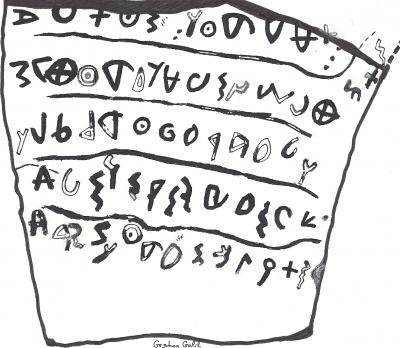









Back in June 2009 I explained that I am not an inerrantist. In response to some initial (but, I think, quite mistaken) criticisms of my comments there, I said in November, “You heard me right the first time, I am not an inerrantist.” I then added some historical perspective to what I was saying with a blog post called “Errantly Assuming Inerrancy in History,” where I discussed the way in which a number of important theologians in history spoke about Scripture, which would be more than enough to make modern inerrantists uncomfortable. In a nutshell, in these blog entries I explained that I think that while inerrancy is false and that I do actually think the biblical writers expressed some false scientific assumptions and may have made minor mistakes on the finer details of history, geography and minor errors like citation errors, the message expressed in the Bible is the very word of God who is infallible, and every part of that message is correct.
Assuming it’s true that great minds think alike, it’s encouraging to see great minds agreeing with what I say, so I welcomed the chance to read Matt Flannagan’s thoughts here, where he summed up and affirmed my view that “one can affirm the authority of the bible, even the claim that it is infallible in what it teaches, without affirming that it is inerrant, in the sense of containing no errors.” Have a look, I think it’s definitely worth reading (naturally, the fact that we agree has nothing to do with it 😉 ).
To be fair, Matt himself did not, in that piece, deny or affirm inerrancy. My position, as I have always made clear, is that inerrancy is false at face value, and if it is qualified to the point where it starts to look plausible, then the one who holds it has to allow for so much error that it’s pointless to use the label “inerrancy” at all because it is misleading.
In spite of the positive response I have seen from very committed and very conservative Christians like me, the negative reaction has not stopped. In a sense I don’t mind this. Those who are firmly committed to a strict doctrine of inerrancy will, initially at least, disagree and react strongly to what I have said. This opens up the possibility of discussing the issue with them, and exposes the issue to a wider audience. That’s a good thing. But I do think that those responses often warrant a response, and at times some sort of corrective as well when they go too far in their critique and step into unfairness or misrepresentation, an inevitable feature of human disagreement it seems.
Recently Jeremy Pierce at the Evangel blog (hosted by First Things) blogged on a blog on a blog (and now I’m blogging on his blog). In a blog entry called “Basic Inerrancy,” he blogged on Matt’s article, who had in turn blogged on what I said earlier. Interestingly, although I took Matt to basically share my view, Jeremy says “I actually agree with much of what Matt says,” while saying of my piece, “There are so many things I disagree with in [Glenn’s] post that it was very hard to pull myself away from my desire to write a detailed response, but I didn’t have the time.” Ah well. But I want to draw attention to the way that Jeremy criticises the position I outlined.
Read More



 At last, the series ends. Here is part five of the series on the mind/body problem. This episode steps completely away from analytical philosophy and is an overview of some of the biblical material that bears on the subject. Although it’s a comparatively long episode (just under fifty minutes), it’s still a very sketchy overview. The subject is a large one, and at best I can get the ball rolling and encourage you to look further. Enjoy. 🙂
At last, the series ends. Here is part five of the series on the mind/body problem. This episode steps completely away from analytical philosophy and is an overview of some of the biblical material that bears on the subject. Although it’s a comparatively long episode (just under fifty minutes), it’s still a very sketchy overview. The subject is a large one, and at best I can get the ball rolling and encourage you to look further. Enjoy. 🙂


